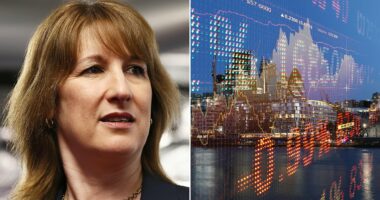Share this @internewscast.com
Unlock the Editor’s Digest for free
A Hong Kong court has ordered China Evergrande to be wound up, opening a new and unpredictable phase in the collapse of the world’s most indebted property developer.
The liquidation order comes just over two years after the company’s official default, which triggered a cash crunch for Chinese developers that is still hobbling the world’s second-largest economy.
High Court Judge Linda Chan issued the order on Monday after the developer failed to come up with a restructuring plan to satisfy international creditors despite lengthy negotiations.
“It would be a situation where the court says enough is enough,” Chan said. “I consider that it is appropriate for the court to make a winding-up order against the company, and I so order.”
The decision is set to test the reach of Hong Kong courts in the Chinese mainland, where foreign claims are widely seen to hold little sway and the property slowdown has become one of Beijing’s biggest political challenges.
While Evergrande is listed in Hong Kong, almost all of its assets and the vast majority of its more than $300bn in liabilities are in China. Authorities have so far prioritised the completion of unfinished projects by developers.
The judge appointed Eddie Middleton and Tiffany Wong, from the restructuring firm Alvarez & Marsal, as Evergrande’s liquidators. Speaking outside the court, Wong said they would begin by meeting management to understand the affairs of the company and discuss next steps.
In her written judgment, Chan said she had decided to order the winding-up because Evergrande had “no restructuring proposal, let alone a viable proposal which has the support of the requisite majorities of the creditors”.
Her decision could trigger further lawsuits stemming from the billions of dollars of losses related to the company’s collapse.
Trading in the Hong Kong-listed shares of Evergrande and two of its subsidiaries was halted after the ruling.
Speaking after the hearing Fergus Saurin, a partner at law firm Kirkland and Ellis, which represents a key group of Evergrande creditors, said: “We are not surprised by the outcome. It’s a product of the company failing to engage with [us].
“There has been a history of last-minute engagement which has gone nowhere. And in the circumstances, the company only has itself to blame for being wound up.”
In theory, the ruling could pave the way for liquidators to attempt to seize control of some Evergrande assets in mainland China, since Hong Kong has a mutual recognition agreement on insolvency and restructuring that applies in some parts of China.
However, it is not clear how far mainland courts will accept the Hong Kong winding-up order. Asked about the issue, Saurin declined to comment.
Shortly after the court order, Chinese media reported that Evergrande chief Shawn Siu responded that the company would “do everything possible” to ensure the continued delivery of property development projects in China, adding that the operational structure of its onshore and offshore subsidiaries was “unaffected” as the court order was based in Hong Kong.
Siu was also cited saying the court decision was “regrettable”.
Evergrande did not immediately respond to a request for comment from the Financial Times.
Brock Silvers, chief investment officer of Hong Kong private equity group Kaiyuan Capital, said in a written comment: “Offshore creditors may lack good alternatives, but a wind-up order from the Hong Kong court today would be the beginning of a multiyear, very costly process ultimately unlikely to yield significant recoveries.”
Before the trading halt and following the order, shares in Evergrande fell more than 20 per cent to HK$0.16, while outstanding dollar bonds issued by the developer traded at deeply distressed levels, with one bond maturing in 2025 trading at less than two cents on the dollar.
A previous deal between Evergrande and international investors fell apart in September after Chinese authorities failed to grant some regulatory approvals. Hui Ka Yan, Evergrande’s chair, was placed under “mandatory measures” days later on suspicion of “illegal crimes”, authorities said at the time.
The winding-up lawsuit was filed in 2022 by offshore creditor Top Shine Global, which said Evergrande had failed to honour HK$863mn (US$110mn) worth of claims.
The decision could have implications for other developers still locked in protracted restructuring negotiations with offshore creditors. Jiayuan, another Chinese developer, received a winding-up order from the same judge last year.






